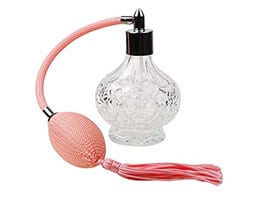 The etymology of fragrance takes us to the Latin fragrantia . According to the dictionary of the Royal Spanish Academy ( RAE ), a fragrance is a pleasant and soft smell .
The etymology of fragrance takes us to the Latin fragrantia . According to the dictionary of the Royal Spanish Academy ( RAE ), a fragrance is a pleasant and soft smell .
For example: “I love the fragrance of jasmine” , “The fragrance of fresh mint takes me back to my grandparents' house, who had a garden full of aromatic herbs” , “The sweet fragrance caught the attention of the young man, who did not “He hesitated to go to the back of the bar.”
In colloquial language, fragrance is used as a synonym for smell, aroma or perfume . For the RAE , a smell is an impression registered by smell; perfume and aroma, meanwhile, can be very pleasant smells. A perfume, furthermore, is a substance that is used to flavor.
In this way, the most common use of fragrance is linked to the aromatic product marketed to produce a good smell . Fragrances can be body fragrances (the product is applied to the body), environmental fragrances (used to perfume the environment) or other types (for clothing, for the car, etc.).
The origins of fragrances, in this sense, are very ancient. Already in prehistory, human beings began to discover the various aromas generated by certain natural elements and to use them for ritual or other purposes.
Floral fragrances are among the most appreciated. There are countless products that imitate the aroma of roses, jasmine, orchids and other flowers so that people can use them to produce pleasant sensations. Fruity fragrances , especially fruits such as lemon, grape and apple, are also very popular.
In addition to the synonyms of the term fragrance expressed in the previous paragraphs, we can point out the following three: effluvium, freshness and essence . It is important to note that it is not correct to use all of these words indiscriminately; For example: it is not normal to say "what a good fragrance this food has" or "I smell an unpleasant fragrance coming from the trunk", but in these cases aroma and smell are usually used, respectively.
 On the other hand, we have two antonyms that can serve to further illustrate the definition of fragrance through the concepts found at the other extreme: pestilence and stench . These terms denote horrible odors, unbearable for humans, which generally come from organic matter in a state of decomposition or from substances that are very harmful to health. If we use them to refer to a person's body odor or that of a food, for example, our intention is to hurt the other's feelings.
On the other hand, we have two antonyms that can serve to further illustrate the definition of fragrance through the concepts found at the other extreme: pestilence and stench . These terms denote horrible odors, unbearable for humans, which generally come from organic matter in a state of decomposition or from substances that are very harmful to health. If we use them to refer to a person's body odor or that of a food, for example, our intention is to hurt the other's feelings.
As in many other areas, it is possible to make a fragrance at home, to save money on industrial products and achieve results that better suit our needs. In this framework we speak of " notes " to refer to the different levels of aromas that make up a perfume. When spraying a fragrance on the body, the notes can be seen in a certain order:
* top notes : they are also known as top notes and are the ones that can be perceived first but also the first to disappear. They usually last approximately 12 minutes, although this varies depending on the product;
* heart notes : these appear when the previous ones evaporate. These are the most important since they give the fragrance its main features , which make it belong to a particular family (such as floral, fresh, woody or oriental, among others);
* base notes : they are also called base notes and are the ones that set and accentuate the heart notes. They are what give the "theme" to the fragrance and allow it to last up to 5 hours.
